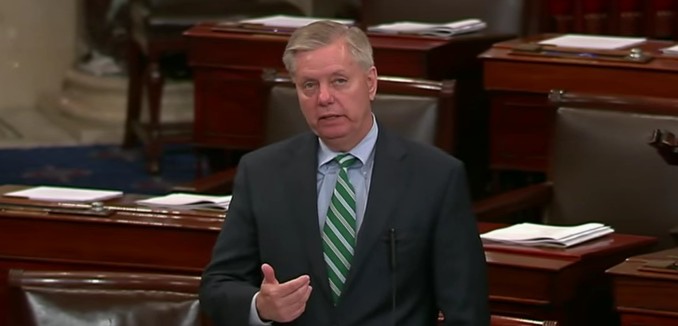In order to ensure that the emerging nuclear deal will effectively prevent Iran from developing nuclear weapons, the United States must insist on implementing eight principles to “achieve a sound, enforceable deal,” Sen. Lindsey Graham (R – S.C) wrote in an op-ed (Google link) in The Wall Street Journal today.
Graham wrote that the principles he is proposing have strong bipartisan support and “largely reflect President Obama’s negotiating position at the start of the process.”
To allow this pariah nation to acquire nuclear weapons and the ability to deploy them against us and our allies—and to share them with radical Islamic organizations—would constitute an incalculable threat to our national security and an existential threat to Israel. It would set off a nuclear-arms race that would virtually guarantee a regional war with global implications.
Alarmingly, our negotiators and the Iranians have offered wildly differing interpretations of the negotiated framework. On every principle, Iran insists it will never accept our terms. Serious questions remain about how this deal can prevent a nuclear Iran.
Will international sanctions be lifted before proof that Iran is in compliance? How and when would sanctions be restored if there are violations? Can we have a good faith agreement with a regime that for decades has lied and cheated, and still has never come clean about its past efforts to weaponize nuclear technology? Will Iran be required to demonstrate changed behavior—with respect to its nuclear ambitions and its sponsorship of terrorism?
The eight principles outlined by Graham before any restrictions on Iran’s nuclear program should be lifted are: limiting Iran to enough enriched uranium to feed a single commercial reactor; shutting down all of Iran’s hidden and fortified nuclear facilities, including Fordow; allowing “anytime, anywhere” inspections of all Iranian military and non-military sites without allowing Iran a veto over inspections; ensuring sanctions relief is conditioned on certification of Iranian compliance by the International Atomic Energy Agency; creating a well-defined process to “snap back” sanctions in case Iran is caught cheating on an agreement; forbidding Iran from developing advanced centrifuges that could reduce its breakout time; removing all enriched uranium from Iran, other than what is needed for a single reactor; and certifying that Iran has changed its aggressive, destabilizing behavior.
In a 2012 interview with journalist Jeffrey Goldberg of The Atlantic, Obama used arguments similar to the ones brought up by Graham today, raising concerns that a nuclear Iran would risk nuclear proliferation in the Middle East, be a more destabilizing force in the region, and would be a threat to share its nuclear technology with terrorists.
In addition to the profound threat that it poses to Israel, one of our strongest allies in the world; in addition to the outrageous language that has been directed toward Israel by the leaders of the Iranian government — if Iran gets a nuclear weapon, this would run completely contrary to my policies of nonproliferation. The risks of an Iranian nuclear weapon falling into the hands of terrorist organizations are profound. It is almost certain that other players in the region would feel it necessary to get their own nuclear weapons. So now you have the prospect of a nuclear arms race in the most volatile region in the world, one that is rife with unstable governments and sectarian tensions. And it would also provide Iran the additional capability to sponsor and protect its proxies in carrying out terrorist attacks, because they are less fearful of retaliation. …
This is something in the national-security interests of the United States and in the interests of the world community.
[Photo: USSenLindseyGraham / YouTube ]




